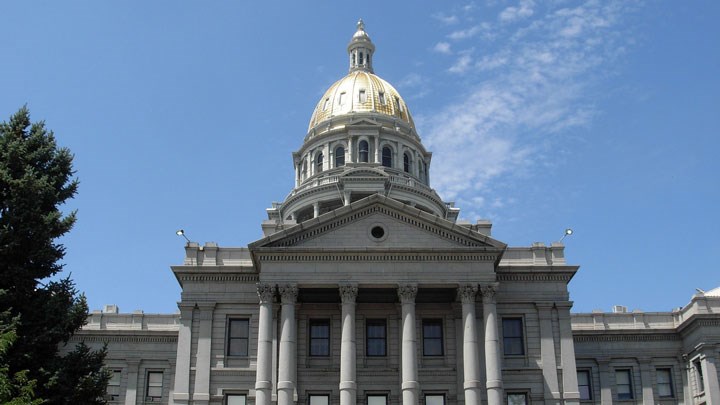
by Brian McCombie - Tuesday, March 14, 2023

Several anti-Second Amendment bills are advancing in the Colorado legislature which, if made into law, would not only infringe on the rights of the state’s citizens but could also have a very damaging effect upon hunting and wildlife conservation. As the NRA Institute for Legislative Action reported, during the week of March 6-10, the Colorado State Senate considered three proposed gun control bills. These bills are still very active and could be voted upon soon.
Senate Bill 23-168 holds members of the firearms industry liable for third-party criminal acts by “knowingly or recklessly creating, maintaining or contributing to a public nuisance.” A legally purchased handgun, for example, that was stolen and used during a crime would fall under this “public nuisance” category. Anyone who was harmed during this crime could then sue the manufacturer that legally made the handgun and/or the retail operation that legally sold the handgun. Such a law would cripple the shooting sports industry within the state and in the process make the exercise of Second Amendment rights difficult if not impossible.
Senate Bill 23-170 would expand Colorado’s “red flag” gun law by allowing certain people to be designated as “qualified” to accuse others of potentially acting out in dangerous and unlawful ways in the future. Once so accused, authorities could then confiscate the firearms of the accused. Second Amendment rights would be suspended based on mere speculation and hearsay evidence, violating citizens’ rights without due process.
Senate Bill 23-169 would prohibit young adults aged 18-20 from purchasing firearms, even though these same adults can vote, join the military without parental permission and enter into contracts. This restriction on personal freedom and choice would, of course, not stop criminals from stealing firearms, getting them on the black market or acquiring them through straw purchasers. It would only infringe on the Second Amendment rights of these young, law-abiding adults.
Meanwhile, the Colorado House is considering House Bill 23-1219, a plan to impose an arbitrary three-day delay on prospective gun owners taking possession of their firearms. Worse, the bill would make this delay even longer or indefinite if authorities fail to complete a background check during that time.
Taken together, these four bills would greatly impact Colorado’s sportsmen and sportswomen, too. If the shooting sports industry cannot operate in Colorado because it was being sued out of existence for the acts of criminals, then firearms and ammunition could not be purchased. And those purchases fuel wildlife conservation in Colorado and across the nation.
According to the U.S. Fish and Wildlife Service the state of Colorado will receive more than $32,311,971 in fiscal year 2023 from the Pittman-Robertson (P-R) Wildlife Restoration Fund. P-R monies are derived from excise taxes placed upon the sales of firearms, ammunition and archery equipment. Since the P-R Fund was established in 1937, more than $15 billion has been apportioned to the 50 states and their various wildlife and conservation agencies to help fund everything from wildlife habitat projects, to hunter education and to the building and maintaining of public shooting ranges.
In 2022 alone, states received $1.5 billion in P-R monies.
And the total impact is many times that $15 billion as P-R funds are appropriated on a cooperative basis, with the agencies that receive P-R monies contributing 25 percent or more of the overall project funding.
But what Colorado retailer is going to risk actually selling firearms or ammunition in Colorado if Senate Bill 23-168 becomes law? What manufacturer of firearms or ammunition will even ship their products to Colorado knowing that as soon as some criminal steals a gun and commits a crime, the manufacturer will likely have to defend itself in court—even though it lawfully produced said products?
And how many 18- to 20-year-olds may be discouraged from buying a hunting license and going afield because they cannot buy the needed firearms with which to hunt?
Hunting also provides important contributions to the Colorado economy. According to Hunting Works for Colorado, which monitors public policy decisions affecting hunting in that state, direct spending on hunting comes to $465 million annually, with a ripple effect of some $763 million to the larger state economy.
Each year, 259,000 people hunt in Colorado. Of those hunters, 115,000 are from out of state. Colorado hunters, resident and nonresident, spend $221 million on trip-related expenditures, plus another $185 million on hunting equipment. The Colorado hunting economy translates to $292 million in salaries and wages as it supports 8,400 Colorado jobs, jobs which also generate $51 million in state and local taxes.
These four gun-control bills, though, could have an extremely stifling effect upon Colorado hunting, wildlife conservation and the larger economy, as well as the 8,000-plus citizens whose livelihoods depend upon the state’s hunting industry.
Please check this NRA website for updates or visit NRAILA.org.
About the Author
NRAHLF.org contributor Brian McCombie is a field editor for the NRA’s American Hunter and writes about firearms and gear for the NRA’s Shooting Illustrated. He is a member of the National Rifle Association and the National Shooting Sports Foundation. Brian likes hunting hogs, shooting 1911s chambered in 10mm and .45 ACP, watching the Chicago Bears and relaxing with his two cats, Peanut Morgan and MikaBear.
E-mail your comments/questions about this site to:
[email protected]
Proudly supported by The NRA Foundation and Friends of NRA fundraising.
